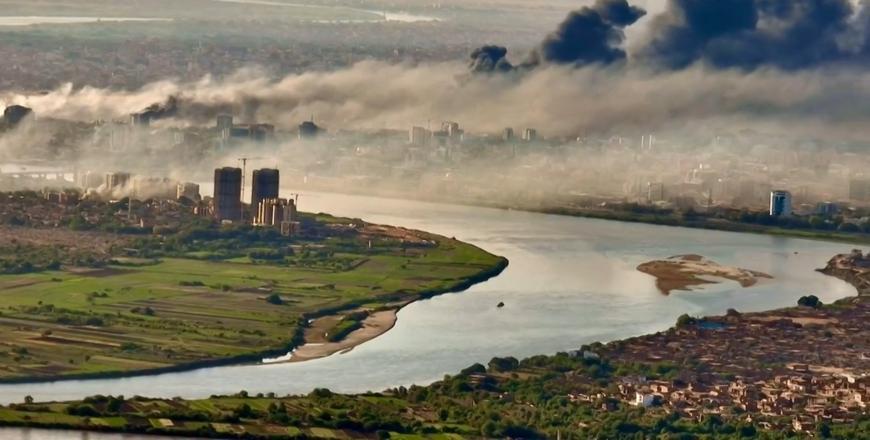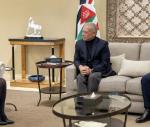You are here
Sudan war drains life from once-thriving island in capital's heart
By AFP - Apr 15,2025 - Last updated at Apr 15,2025

This video grab taken from AFPTV video footage on April 19, 2023, shows an aerial view of black smoke covering the sky above the capital Khartoum (AFP photo)
KHARTOUM — An island in the middle of Sudan's capital that used to draw crowds to its Nile River farms now stands nearly deserted after two years of war, its homes ransacked and once-lush fields left fallow.
Nestled at the confluence of the Blue and White Nile rivers, Tuti Island has been devastated by two years of war between the Sudanese army and the paramilitary Rapid Support Forces (RSF), with residents subjected to violence and looting.
When fighting broke out on April 15, 2023, RSF fighters swiftly captured the crescent-shaped island, forcing residents to flee in panic.
"They fled in feluccas [sailing boats], leaving everything behind," said Youssef al-Naim, 67, one of the handful of residents who never left.
The war has devastated the nation, killed tens of thousands and uprooted 13 million, according to the United Nations.
At the beginning of the war, the RSF had gained control of wide swathes of the capital, outflanking the army in the north and south, before the tides turned in the army's favour earlier this year.
The island, accessible only by a single suspension bridge, was cut off and besieged by the RSF since the war began.
Residents were deprived of food, electricity and safe drinking water, even before fighters descended on the island.
Lifeless
"We used to carry water from a well for washing and drink from the Nile," Naim said.
"Sometimes we couldn't reach the river and drank the well water, which made people sick."
Those able to pay for passage, fled in sailing boats and then the back of lorries, headed east.
"Every day, 10 or more people would leave," Naim recalled as he sat on a tattered fabric chair.
Tuti island was once known as "Khartoum's garden" for its verdant fields of beans, arugula and fruit trees that supplied much of the capital's produce.
Now, the eight-square-kilometre floating patch, overlooking Khartoum, Omdurman and Bahri [Khartoum North] which form the greater Sudanese capital, appears nearly lifeless.
"For nearly two years, I haven't seen a single tomato," Naim said.
An AFP team that visited the island after the army retook it in March saw signs of the sudden exodus.
Doors hung ajar, children's toys were scattered across the ground and shredded fabric fluttered through the ruins.
Scars of war
On March 22, Sudan's army regained control of the Tuti bridge as part of its broader offensive to retake Khartoum. Within a week, Burhan declared the capital "free".
But the scars of two years of war run deep, with RSF fighters accused of subjecting civilians to indiscriminate violence.
"They beat children, the elderly and even pregnant women," Abdel Hai Hamza, another resident, told AFP.
Witnesses also described systematic looting, with fighters raiding homes in search of gold jewellery, cash and weapons.
"They had to leave houses with something," added Hamza, 33.
The conflict has decimated Sudan's infrastructure, crumbled an already weak economy and pushed millions to the brink of mass starvation.
In Khartoum alone, at least 3.5 million have been displaced while 100,000 are suffering from famine-levels of hunger, according to the UN.
Both the army and the RSF have been accused of war crimes, but the paramilitary in particular has become notorious for allegedly committing systematic sexual violence, ethnic cleansing and massive looting.
Now, with the bridge to Tuti reopened and RSF fighters pushed out, some residents are making their way back, determined to rebuild their lives.
"Residents are trying to restore electricity," after cables were cut by the RSF, said Sherif Al Tayeb, a former resident of Tuti who now lives abroad and still has close friends among the island's residents.
Despite the devastation, small groups of civilians clean the streets with shovels and buckets, while dump trucks haul away the remnants of their shattered lives.
















